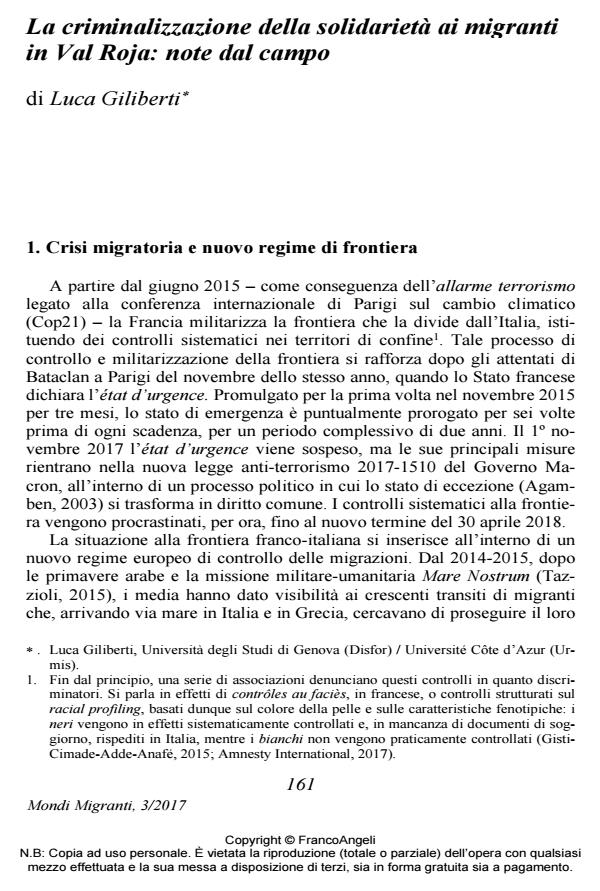La criminalizzazione della solidarietà ai migranti in Val Roja: note dal campo
Journal title MONDI MIGRANTI
Author/s Luca Giliberti
Publishing Year 2018 Issue 2017/3
Language English Pages 21 P. 161-181 File size 299 KB
DOI 10.3280/MM2017-003008
DOI is like a bar code for intellectual property: to have more infomation
click here
Below, you can see the article first page
If you want to buy this article in PDF format, you can do it, following the instructions to buy download credits

FrancoAngeli is member of Publishers International Linking Association, Inc (PILA), a not-for-profit association which run the CrossRef service enabling links to and from online scholarly content.
Starting from June 2015, with the terror alert, France has militarized its border with Italy, establishing systematic controls. Within a new border regime, the Roya Valley - a rural area of the Maritime Alps, situated between France and Italy - has become central to migration routes towards other European countries. In this valley, a network of solidarity with migrants has emerged, offering hospitality, care and judicial support. This network is criminalized by the state logic, which assimilates its activities to those of smugglers. At the same time, sympathetic citizens have begun to report irregularities in the French State’s application of asylum legislation. This contribution analyzes the network of solidarity with migrants in the Roya Valley, its relations with other civil society actors in the area and the process of its criminalization, characterized by so-called solidarity crimes. The ethno-graphic research, which started at the beginning of 2017, is still in progress in a context of ongoing transformation.
Keywords: Border; Migratory crisis; Criminalization of solidarity; Solidarity criminals; Solidarity crimes; Ethnography
- Le migrazioni oltre le polemiche e i luoghi comuni: dieci anni di Mondi Migranti Maurizio Ambrosini, in MONDI MIGRANTI 1/2018 pp.7
DOI: 10.3280/MM2018-001001 - The Urban Governance of Asylum as a “Battleground”: Policies of Exclusion and Efforts of Inclusion in Italian Towns Maurizio Ambrosini, in Geographical Review /2021 pp.187
DOI: 10.1080/00167428.2020.1735938 - Supporting Migrants Mobility Across Securitised Borders Cecilia Vergnano, in Champ pénal /2021
DOI: 10.4000/champpenal.12658 - Lingua (non) grata Daniela Trucco, pp.277 (ISBN:9782858314096)
- Why take such a risk? Beyond profit: motivations of border‐crossing facilitators between France and Italy Cecilia Vergnano, in Social Anthropology /2020 pp.743
DOI: 10.1111/1469-8676.12918 - Migration, Borders and Citizenship Maurizio Ambrosini, Manlio Cinalli, David Jacobson, pp.1 (ISBN:978-3-030-22156-0)
- Cittadinanza dal basso e solidarietà inclusiva. L'alleanza trasversale tra migranti e cittadini a Napoli durante la pandemia da Covid-19 Rosa Gatti, in MONDI MIGRANTI 1/2022 pp.83
DOI: 10.3280/MM2022-001005 - Verso una nuova governance transfrontaliera nell'Unione europea? Il caso del confine Italia-Francia Raffaella Coletti, in RIVISTA GEOGRAFICA ITALIANA 1/2024 pp.91
DOI: 10.3280/rgioa1-2024oa17378 - Migrazioni oltre le aree metropolitane: le sfide della cittadinanza "dal basso" in un sistema insediativo marchigiano Maria Letizia Zanier, Marta Scocco, in MONDI MIGRANTI 1/2022 pp.101
DOI: 10.3280/MM2022-001006 - European Virtual Politics German Carboni, in Politeja /2019 pp.153
DOI: 10.12797/Politeja.16.2019.63.10 - Migration, Borders and Citizenship Luca Giliberti, Luca Queirolo Palmas, pp.109 (ISBN:978-3-030-22156-0)
- Local “Battlegrounds”. Relocating Multi-Level and Multi-Actor Governance of Immigration Iraklis Dimitriadis, Minke H. J. Hajer, Elena Fontanari, Maurizio Ambrosini, in Revue européenne des migrations internationales /2021 pp.251
DOI: 10.4000/remi.18552 - Solidarité en Europe : état de l’art sur la criminalisation de l’aide aux personnes en situation irrégulière Mathilde Du Jardin, in Déviance et Société /2022 pp.519
DOI: 10.3917/ds.464.0109
Luca Giliberti, La criminalizzazione della solidarietà ai migranti in Val Roja: note dal campo in "MONDI MIGRANTI" 3/2017, pp 161-181, DOI: 10.3280/MM2017-003008